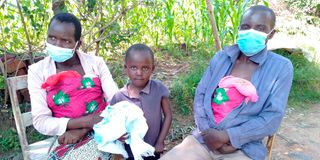Men set aside beliefs to care for their premature babies

Sarah Kwemoi wife to Philip Barasa They are applying the Kangaroo nursing method to their preterm twins Favour and Esther, while Muhambe Cynthia , community health worker from Save the Children, pays a visit to their home In muyayi Village kanduyi constituency, Bungoma County. PHOTO|Jesse Chenge
What you need to know:
- Hospitals in rural areas like Mt Elgon sub-county in Bungoma County, which do not have enough incubators for pre-term babies, are resorting to kangaroo care to save thousands of babies in Kenya
In western Kenya, as in other parts of the Africa, childcare is usually the responsibility of the mother; tradition and culture have relegated fathers to the backseat.
But this is gradually changing, thanks to a health initiative that’s getting fathers to help mothers save the lives of their premature babies.
Hospitals in rural areas like Mt Elgon sub-county in Bungoma County, which do not have enough incubators for pre-term babies, are resorting to kangaroo care to save thousands of babies in Kenya.
In kangaroo care, the baby, who is usually naked except for a diaper, is placed against a parent’s bare chest in an upright position. The skin-to-skin contact provides heat from the parent, keeping the baby warm and helping it gain weight much faster
This practice has been adopted by fathers in other parts of Bungoma County, including Kanduyi and Bumula, helping their wives with the kangaroo method in hospitals and at home, despite cultural beliefs and practices in the region.
Lack of electricity in rural hospitals and the distance to the hospitals also discourages many pregnant women from going there to give birth and look after the babies. Kangaroo care therefore fills the gap of a nursery or incubator.
After giving birth to a premature baby, new mother Flever Mukwana, thought the baby had died. When she left the hospital and came back with her family to pick the body, they learnt that the baby was alive and in the incubator. She was then shown how to take care of the baby through kangaroo care.
After the baby gained enough weight, Flever was discharged from Bungoma Referral Hospital to continue with the kangaroo care at home.
At the hospital, nurses and doctors work round the clock to train mothers and fathers on how to provide kangaroo care for their babies.
“The challenge we usually face is that these mothers get tired and occasionally need support. So when they need support, we usually need the men to come in, we call it kangaroo father care,” says Rose Mututa, the head of the newborn unit at the facility.
“Usually, in Luhya land, we have superstitions about men taking care of the newborns. However, we are initiating men into it and they are gradually accepting kangaroo care,” she adds. “They realise it benefits the baby, who must be at least 2.5 kilogrammes before being discharged from the hospital.”
“So far, we have four men; some are positive but some fear, so sometimes they need their own room. If a father comes and sees he is the only man, he will shy away,” she Ms Mututa says.
In Muyayi village, Bungoma County, Philip and his wife Sarah Kwemoi are using kangaroo care for their pre-term twins Favour and Esther, while sitting under a tree outside their house. They had just returned from hospital three days prior.
“I thank my husband because he used to come to hospital and sometimes help me kangaroo one of the twin as I am helping the other one,” says Sarah. “This is by the grace of God because it is unusual. As a mother I feel good,” Sarah adds.
Her husband Philip tells us about the cultural stigma.
“When they see a man practising kangaroo care, they see it as being controlled by your wife, but that’s not the case. If it wasn’t the effort we put into caring for these babies, we wouldn’t have been discharged that fast from the hospital,” he says.
“When I kangaroo my children I feel good because it comes from my heart. The love of a father to his child,’’ he adds.
Save the Children International project specialist Teresa Akun, a kangaroo care champion in Western Kenya, says that so far 11,000 babies have benefited from the programme since inception.
“We have been doing a lot of advocacy, mostly mothers are self-care givers for this babies and there are a lot of cultural beliefs around prematurity. In most, cases community thinks it’s a curse, maybe there is something that you did that has made you get a very small baby. So, we have been talking about this to demystify the myths around pre-term babies,” says Ms Akun.
Countries such as Tanzania, Uganda, Rwanda, Comoros, Nigeria, Togo, Mali and Nigeria have also started embracing the kangaroo care method.
According to the World Health Organizations, an estimated 15 million babies are born premature every year. Approximately one million of these children die each year due to complications. Many of those who survive face a lifetime of disability, including learning disabilities and visual and hearing problems.
The health agency offers a number of recommendations for improving the survival, health and well-being of pre-term and low birth weight babies. This includes kangaroo care and involving families in the care of their babies right from the time of birth.



